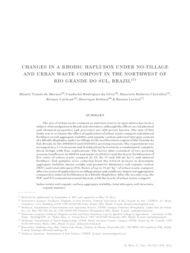Charges in a rhodic hapludox under no-tillage and urban wast compost in the northwest of Rio Grande do Sul, Brazil.
Charges in a rhodic hapludox under no-tillage and urban wast compost in the northwest of Rio Grande do Sul, Brazil.
Author(s): MORAES, M. T. de; SILVA, V. R. da; CHERUBIN, M. R.; CARLESSO, R.; DEBIASI, H.; LEVIEN, R.
Summary: The use of urban waste compost as nutrient source in agriculture has been a subject of investigation in Brazil and elsewhere, although the effects on soil physical and chemical properties and processes are still poorly known. The aim of this study was to evaluate the effect of application of urban waste compost and mineral fertilizer on soil aggregate stability and organic carbon and total nitrogen content of a Rhodic Hapludox under no-tillage in the northwestern region of Rio Grande do Sul, Brazil, in the 2009/2010 and 2010/2011 growing seasons. The experiment was arranged in a 2 × 6 (seasons and fertilization) factorial in a randomized complete block design with four replications. The factor time consisted of two growing seasons (sunflower in 2009/10 and maize in 2010/11) and the factor fertilization of five rates of urban waste compost (0, 25, 50, 75 and 100 m3 ha-1), and mineral fertilizer. Soil samples were collected from the 0.0-0.10 m layer to determine aggregate stability (mean weight and geometric diameter), soil organic carbon (SOC) and total nitrogen (TN). Rates of up to 75 m3 ha-1 of urban waste compost, after two years of application to no-tillage maize and sunflower, improved aggregation compared to mineral fertilization in a Rhodic Hapludox. After the second crop, the SOC and TN contents increased linearly with the levels of urban waste compost.
Publication year: 2014
Types of publication: Journal article
Unit: Embrapa Soybean
Keywords: Brasil
Observation
Some of Embrapa's publications are published as ePub files. To read them, use or download one of the following free software options to your computer or mobile device. Android: Google Play Books; IOS: iBooks; Windows and Linux: Calibre.
Access other publications
Access the Agricultural Research Database (BDPA) to consult Embrapa's full library collection and records.
Visit Embrapa Bookstore to purchase books and other publications sold by Embrapa.

